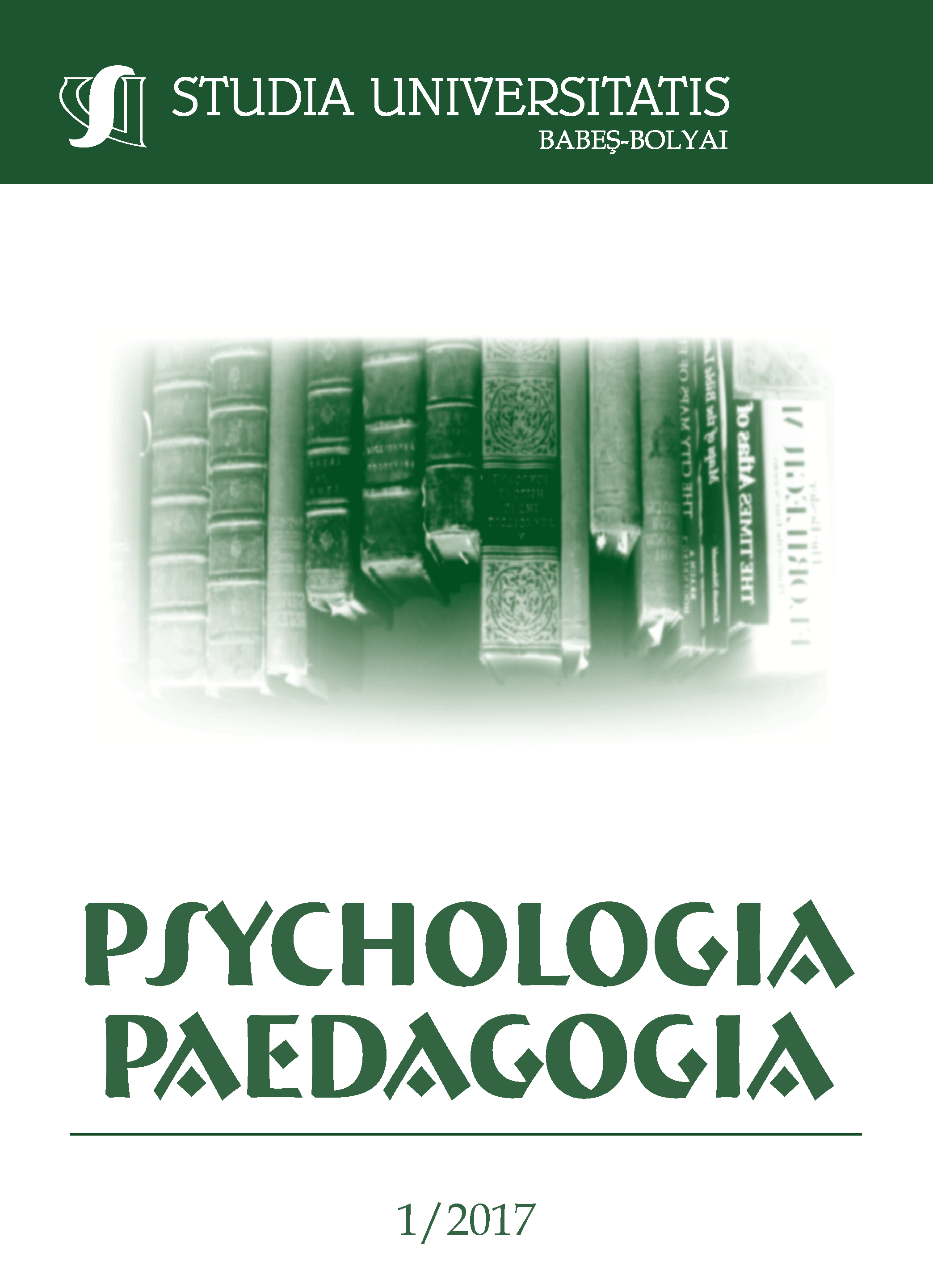METACOGNITIVE TRAINING EFFECTS ON MATHEMATICAL PERFORMANCE OF LEARNING DISABILITY STUDENTS FROM INCLUSIVE CLASSROOMS
DOI:
https://doi.org/10.24193/subbpsyped.2017.1.03Keywords:
metacognition, training, learning disability, math performanceAbstract
In the current study we investigate the effects of a metacognitive training on LD students math performance. It’s known as metacognitive training may influence the school math performance, but there is not enough research on the metacognitive training of learning disability students. The participants were 7th grade students from two different inclusion schools who were randomly into one of the three groups. First group received an individual metacognitive training, the second one a metacognitive training combined with the cooperative learning and the third one was the control group.
Metacognitive Ausbildungswirkungen Auf Die Mathematische Leistung Den Lernbehinderte Studenten Aus Inklusiven Klassenzimmern. In der aktuellen Studie untersuchen wir die Auswirkungen einer metakognitiven Ausbildung auf der Mathe Leistung von lernbehinderten Studenten. Es ist bekannt, dass metakognitive Ausbildung die schulische Mathe Leistung beeinflussen kann, aber es gibt nicht genug Forschung über die metakognitive Ausbildung von Lernbehinderten Studenten. Die Teilnehmer waren Schüler der 7. Klasse aus zwei verschiedenen Inklusionsschulen, die zufällig in einer der drei Gruppen waren. Die erste Gruppe erhielt eine individuelle metakognitive Ausbildung, die zweite eine metakognitive Ausbildung, kombiniert mit dem kooperativen Lernen, und die dritte war die Kontrollgruppe.
Schlüsselwörter: Metakognition, Ausbildung, Lernbehinderung, Matheleistung
References
David, C., Maier, A. (2011). The effects of working memory training vs. metacognitive training on math performance of low achieving students, Studia UBB Psychologia Paedagogia, 1, 89-100.
Desoete, A., Roeyers, H., Buysse, A. (2001). Metacognition and Mathematical Problem Solving in Grade 3, Journal of Learning Disabilities 34 (5), 435-449.
Desoete, A., Roeyers, H., De Clercq, A. (2004). Children with Mathematics Learning Disabilities in Belgium, Journal of Learning Disabilities, 37 (1), 50-61.
Desoete, A. (2007). Evaluating and Improving the Mathematics Teaching-Learning Process through Metacognition, Electronic Journal of Research in Educational Psychology, 5 (3), 705-730.
Desoete, A. (2009). Mathematics and metacognition in adolescents and adults with learning disabilities, International Electronic Journal of Elementary Education, 2 (1), 82-100.
Garrett, A., Mazzocco, M., Baker, L. (2006). Development of the Metacognitive Skills of Prediction and Evaluation in Children With or Without Math Disability, Learning Disabilities Research & Practice, 21 (2), 77-88.
Kramarski, B. & Mevarech, Z. (2003). Enhancing Mathematical Reasoning in the Classroom: Effects of Cooperative Learning and Metacognitive Training, American Educational Research Journal, 40 (1), 281-310.
Maier, A. (2009). Metacognitive training and school performance in Anca M. (coordinator, editor), Tendințe psihopedagogice moderne în stimularea abilităților de comunicare, vol 1, Presa Universitară Clujeana: Cluj-Napoca.
Maier, A. (2011). The Effects of Metacognitive Training on Math Performance: Individual versus Small Group, Studia UBB Psychologia Paedagogia, Cluj-Napoca, 2, 85-94.
Maier, A. (2016). Metacognition and math learning disability, in Mogonea F., Ilie V. (coord), Educatie si spiritualitate, Ed. Mitropolia Olteniei, Craiova.
Mevarech, Z. R. & Kramarski, B. (1997). IMPROVE: A multidimensional method for teaching mathematics in heterogeneous classrooms, American educational Research Journal, 34, 365-394.
Mevarech, Z. (1999). Effects of Metacognitive Training Embedded in Cooperative Settings on Mathematical Problem Solving, The Journal of Educational Research, 92 (4), 195-205.
Mevarech, Z., Kramarski, B. (2003). The Effects of Metacognitive Training versus Worked-out Examples on Students’ Mathematical Reasoning, British Journal of educational Psychology, 73, 449-471.
Mevarech, Z., Fridkin, S. (2006). The Effects of IMPROVE on mathematical knowledge, mathematical reasoning and metacognition, Metacognition Learning 1, www.springerlink.com.
Montague, M. & Bos, C.S. (1990). Cognitive and metacognitive characteristics of eighth-grade students’ mathematical problem solving, Learning and Individual Differences, 2, 371-388.
Montague, M. (1992). The Effects of Cognitive and Metacognitive Strategy Instruction on the Mathematical Problem Solving of Middle School Students with Learning Disabilities, Journal of Learning Disabilities, 25 (4).
Downloads
Published
How to Cite
Issue
Section
License
Copyright (c) 2017 Studia Universitatis Babeș-Bolyai Psychologia-Paedagogia

This work is licensed under a Creative Commons Attribution-NonCommercial-NoDerivatives 4.0 International License.





